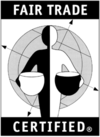Fair trade
Fair Trade products are items such as coffee, sugar, tea, chocolate, and bananas that are labeled with a Fair Trade Certified symbol. It guarantees a fair price to poor farmers for their products. Green America describes it as a "system of exchange that honors producers, communities, consumers, and the environment."[1]
Contents
Background
The idea of fair trade began, New Internationalist, reports "in the late 1940s when churches in North America and Europe sought to provide relief to refugees by selling their handicrafts to Northern markets. Then in 1988, Max Havelaar, the first fair trade certification initiative was launched in Holland. The name was taken from a fictional character who opposed the exploitation of coffee pickers in Dutch colonies. In 1997, the Fair Trade Labelling Organization (FLO) brought Max Havelaar together with counterparts in other countries. Today, the FLO operates in 19 countries in Europe, Japan, North America, Mexico, Australia and New Zealand/Aotearoa." [1]
Fair trade principles
- Producers are paid a fair price and workers a fair wage. For crops like coffee, tea and bananas, farmers are paid a stable minimum price.
- The links between buyers and sellers are shortened, doing away with "middle men".
- Buyers and producers develop long-term relationships of mutual support and benefit.
- All aspects of the trading relationship are open to public accountability
- Exploitative child labour and forced labour are prohibited.
- Working conditions are healthy and safe.
- Goods are produced and crops grown in an environmentally sustainable way.
Related Groups
- Fair Trade Resource Network
- TransFair USA
- Fair Trade and Economic Justice Fund
- Fair Trade Federation
- SERRV
- California Coalition for Fair Trade and Human Rights
Resources
Related SourceWatch articles
References
- ↑ What is Fair Trade?, Green America, accessed December 2010.
Left Criticism
- Gavin Fridell , Fair Trade Coffee: The Prospects and Pitfalls of Market-Driven Social Justice (University of Toronto Press, 2007).
External articles
- "Fair Trade", New Internationalist Number 322 April 2000. (Special theme edition).
- Nikki Sullings, “Can Fair Trade Coffee Remain Fair? Investigating the Politics of Multinational Involvement in Trade-based Development Initiative,” Refereed paper presented to Activating Human Rights and Peace: Universal Responsibilty, Byron Bay, Australia, July 1-4, 2008.
- Kara Newhouse, "“Fair Trade Wants You!” The Neoliberal Politics of Conscious Consumption, Pulse Media, May 8, 2010.
External resources
- Website, TransFair USA, accessed February 2008.
- Fair Trade Coffee, Global Exchange, accessed February 2008.
- Website, Fairtrade Labelling Organizations International, accessed February 2008.
- Ethical consumerism, Wikipedia, accessed December 2010.
| This article is a stub. You can help by expanding it. |
